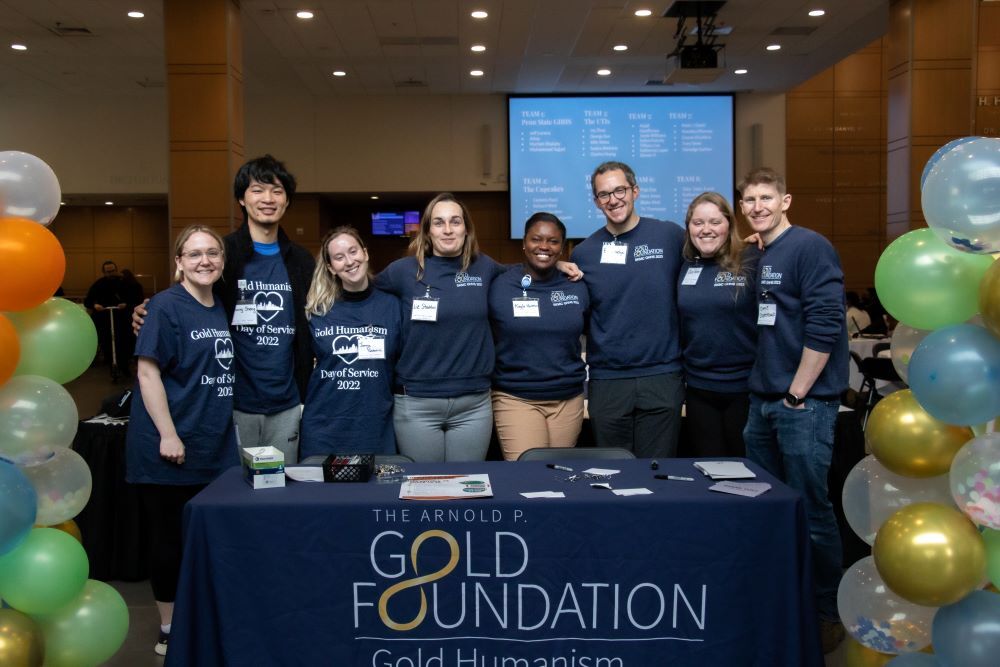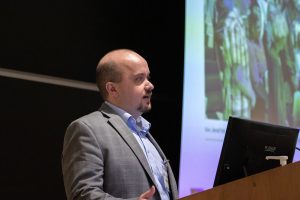One challenge. Two days. Three winning ideas.

The GHHS chapter of Sidney Kimmel Medical College led the Healthcare Barriers Hackathon.
In late March, healthcare students and professionals gathered for the first Healthcare Barriers Hackathon, an event designed to encourage creativity and collaboration by giving participants dedicated time—and a dedicated team—to design solutions to a pressing healthcare issue. The Hackathon was hosted by Thomas Jefferson University’s Sidney Kimmel Medical College chapter of the Gold Humanism Honor Society and was the first event of its kind supported by the Gold Foundation.
Participants from Philadelphia and across the country came together to address a major health crisis: Black maternal morbidity and mortality inequities. The racial disparities affecting maternal health are stark: according to the CDC, Black women are three times more likely to die from a pregnancy-related cause than white women. This disparity is evident in the Philadelphia area, where Black birthing patients have significantly worse outcomes compared to other groups.
By targeting a problem in the local community, the teams were developing ideas that could lead to real change. The main day of the Hackathon — Saturday, March 25 — began with talks by content experts, which gave participants a foundation to start their “hacking.” These presentations offered an overview of racial, gender, geographical, and generational inequities in health, as well as a look at the efforts to ameliorate these inequities through programs at Jefferson Health.

An expert mentor listens to a team member’s ideas.
The Hackathon participants included many students from healthcare-related programs, with 19 schools represented. Other participants were healthcare professionals and individuals from fields as varied as cell biology, industrial design, and textile engineering. Divided into eight teams, they were supported by expert mentors, who circulated to help with brainstorming, as well as by the SKMC GHHS chapter leadership, including Chapter President Kayla Holston.
“We hoped that participants would see the value in working as a team to address issues that seem too large to tackle as individuals,” said Eli Cehelyk, a medical student at Sidney Kimmel Medical College and Director of Operations of the school’s GHHS chapter. “Ultimately, we wanted participants to see the impact students can have on the delivery of compassionate, humanistic care to patients who need our help most.”
On Sunday morning, the teams presented their solutions virtually to a panel of expert judges who voted on the top three presentations. The winners were:
First place:
Reducing Mortality of Black Birthing People By Increasing Access To Doula Services (Jacqueline Penn, Lem Phan, Masha Morozov, Katie Senter, Tahir Tahir-Farid): The program would provide a framework to connect patients with doula services (during pregnancy and up to 3 months postpartum), with fees covered for patients participating in the pilot program.
Second place:
An App Called Mamagotchi (Anjali Upadhyaya, Justin Williams, Sofiya Kalyniy, Tiffany Liao, Katherine López, Steven Yi): The app would be designed as a “one-stop shop” for all things postpartum care, including symptom monitoring, educational materials, and referrals for resources and support.
Third place:
Peri- and Post-Partum Preeclampsia Prevention (Mia Belovsky, Clara Farrehi, Rishi Gadepally, John Vaile): This initiative proposed a way to increase peripartum screening for preeclampsia using a closed-loop text messaging system.
The scope of the ideas generated during the event highlights just how much can be done in a short time by people connected in their mission.

Dennis J. Hand, PhD, Assoc. Professor, Nursing & Psychiatry/Human Behavior at Thomas Jefferson University, speaking to participants.
“The energy in the room was palpable. The student leaders of the SKMC GHHS chapter ran this event extremely smoothly, from the lectures on design thinking and maternal health disparities, to the selectively invited experts who coached the teams and the exquisitely detailed participant guide,” said Michelle Sloane, Assistant Director of Program Initiatives at the Gold Foundation, who attended the Hackathon. “It was amazing to see how polished each team’s ideas were in their formal pitch presentation less than 24 hours later!”
Looking ahead, perhaps this inaugural Healthcare Barriers Hackathon was just the beginning.
“We are thrilled that our first Hackathon was a success, with all teams presenting excellent potential solutions to this devastating issue we are facing,” said Mr. Cehelyk. “With diverse teams and students from all over the country, we are proud of this first of hopefully many Hackathons to come!”

